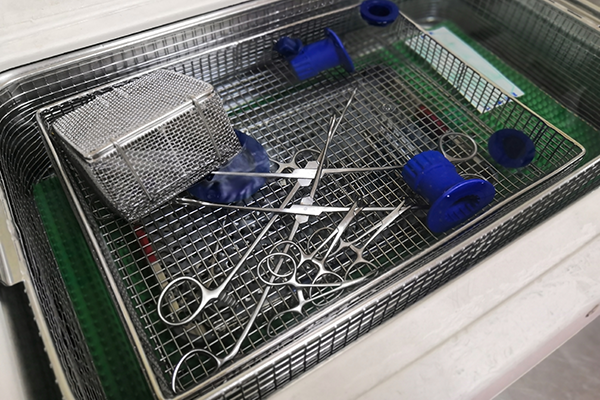The reusable medical device industry has advanced over the last decade, which has led to an increase in new reusable devices. New devices require extensive testing that must be reviewed by the Food and Drug Administration (FDA) or other regulatory bodies to ensure that they are safe for patient use. This testing includes the validation testing for the reprocessing (or processing) procedures. Validation tests ensure that the recommended cleaning and disinfection or sterilization procedures are effective in rendering the device safe for repeated use between patients.
Typically, it is the responsibility of the device manufacturer to perform and/or coordinate the reprocessing validation tests. The validation test reports are reviewed by the FDA or other regulatory bodies to ensure that the device meets the requirements. However, there are some instances in which a new medical device might not have its validation testing reviewed prior to the device being used on a patient. In these instances, it can be difficult to understand what testing is needed for the device.
One instance in which a reusable medical device may not have its validation testing reviewed prior to use is when the device is designed by a healthcare facility or provider for their exclusive use. These medical devices are created by a specific facility and are intended for a specific use at that facility only. They are not intended to be shared or sold to other healthcare facilities or providers. As such, these devices do not go through a typical review process by the FDA or other regulatory bodies.
Another instance in which a reusable medical device may not have its validation testing reviewed prior to use is a novel, reusable medical device that is undergoing clinical trials to determine its effectiveness. Since these devices are not being shared or sold to healthcare facilities, validation testing may not go through a review by the FDA or another regulatory body prior to use.
In both instances, the sterile processing departments at the healthcare facility will require procedures for cleaning and disinfection or sterilization for these devices, as they will be reused between patients. Because there is no regulatory review of the devices at this point, how can sterile processing staff ensure that the devices are being effectively reprocessed?

Currently, and for this specific type of device, there is no clear answer to this question. Some may assume that the simple solution would be to write a set of procedures and provide them to the sterile processing department, but without data to support the effectiveness of these procedures, multiple risks would be introduced. These risks include the potential spread of infection, which could lead to patient deaths, and/or damage to devices, which could lead to user or patient injury.
A possible solution would be to perform abbreviated reprocessing validation testing for the cleaning and disinfection or sterilization procedures. This might involve testing activities similar to the full validation but with a smaller sample size or removal of simulated use cycles prior to the cleaning validation. However, this solution still involves risk. The abbreviated testing would not fully demonstrate whether the procedures are effective.
The best solution would be to perform the full reprocessing validation testing, as you would perform for a typical reusable medical device. These validations are designed to ensure that reusable medical devices can be rendered safe for use between patients and over multiple cycles of use and reprocessing. As such, the best practice for reusable medical devices made by hospitals or used for clinical trials would be to follow the same required reprocessing validation testing you would follow for reusable medical devices subject to regulatory review. The following sections outline the general requirements for such testing.
Cleaning Validation Testing
Hospital/provider-designed medical devices and/or devices being used for clinical trials that contact either sterile areas of the body and/or mucous membranes should follow the cleaning validation requirements for critical and semi-critical reusable medical devices. This would include simulated use cycles prior to the cleaning validation, three positive device controls, and two analytical endpoints.
Hospital/provider-designed medical devices and/or devices being used for clinical trials that contact intact skin or are non-patient contacting should follow the cleaning validation requirements for non-critical reusable medical devices. This would entail device assessment for cleanliness by visual examination and, if necessary, one analytical endpoint, at minimum, based on the use of the device.
The following documents and standards provide information on the requirements for cleaning validations of reusable medical devices:
- FDA guidance document, Reprocessing Medical Devices in Health Care Settings: Validation Methods and Labeling, Guidance for Industry and Food and Drug Administration Staff 2015/(R2017)
- ANSI/AAMI ST98:2022, Cleaning validation of health care products – Requirements for development and validation of a cleaning process for medical devices
- ISO 17664-1:2021. Processing of health care products—Information to be provided by the medical device manufacturer for the processing of medical devices – Part 1: Critical and semi-critical medical devices
- ISO 17664-2:2021. Processing of health care products—Information to be provided by the medical device manufacturer for the processing of medical devices – Part 1: noni-critical medical devices
Disinfection Validation Testing
Hospital/provider-designed medical devices and/or devices being used for clinical trials that contact mucous membranes should follow the disinfection requirements for semi-critical reusable medical devices. This would mean that the terminal process should be high-level disinfection at minimum.
Hospital/provider-designed medical devices and/or devices being used for clinical trials that contact intact skin or are non-patient contacting should follow the disinfection requirements for non-critical reusable medical devices. This would mean that the terminal process should be either low-level or intermediate-level disinfection based on the use of the device.
The following documents and standards provide information on the requirements for disinfection validations of reusable medical devices:
- FDA guidance document, Reprocessing Medical Devices in Health Care Settings: Validation Methods and Labeling, Guidance for Industry and Food and Drug Administration Staff 2015/(R2017)
- AAMI TIR12:2020/(R)2023, Designing, testing, and labeling reusable medical devices for reprocessing in health care facilities: A guide for device manufacturers
- ISO 17664-1:2021. Processing of health care products—Information to be provided by the medical device manufacturer for the processing of medical devices – Part 1: Critical and semi-critical medical devices
- ISO 17664-2:2021. Processing of health care products—Information to be provided by the medical device manufacturer for the processing of medical devices – Part 1: noni-critical medical devices
Sterilization Validation Testing
Hospital/provider-designed medical devices and/or devices being used for clinical trials that contact either sterile areas of the body and/or mucous membranes should follow the sterilization validation requirements for critical and semi-critical reusable medical devices. This would mean that devices that contact sterile areas of the body (critical devices) must be terminally sterilized before use. Those devices that contact mucous membranes (semi-critical devices) must go through high-level disinfection at minimum, but they should be terminally sterilized as a best practice.
The following documents and standards provide information on the requirements for sterilization validations of reusable medical devices:
- FDA guidance document, Reprocessing Medical Devices in Health Care Settings: Validation Methods and Labeling, Guidance for Industry and Food and Drug Administration Staff 2015/(R2017)
- AAMI TIR12:2020/(R)2023, Designing, testing, and labeling reusable medical devices for reprocessing in health care facilities: A guide for device manufacturers
- ISO 17665:2024, Sterilization of health care products – Moist heat – Requirements for the development, validation and routine control of a sterilization process for medical devices
- ISO 17664-1:2021. Processing of health care products—Information to be provided by the medical device manufacturer for the processing of medical devices – Part 1: Critical and semi-critical medical devices
In summary, although the two categories of reusable medical devices we have discussed—those that are designed by a hospital or provider for their sole use and those that are used for clinical trial testing—may not go through the typical review process with the FDA or other regulatory bodies, it is still best practice to perform the full reprocessing validation testing on these devices. Since the devices are intended to be used on multiple patients, it is critical to patient and user safety that they can be adequately cleaned and disinfected or sterilized.
If you have a medical device that falls into one of these two categories, the guidance we have provided above should help you. Of course, you can always reach out to our reprocessing experts, who can recommend the most appropriate testing for your device. They can be reached at [email protected].
Learn more about the authors below.




